2020 Activity Report
March Activity Report
31 March 2021
Global Japan Office Coordinator
Yulia Korovina
Hello everyone!
Despite the difficulty of in-person gatherings, due to the coronavirus situation, the student Japan-Russia Conversation Club "Hey! Say!" did not stop its activities.
There were also online gatherings that attracted more participants than the usual face-to-face gatherings. I have decided to ask the club activities of the "Coronavirus Era" to Shakhida Diusheeva, the current club representative who is a graduate of the Department of Japanese Studies at the Institute of Oriental Studies and a student in the Master of Arts " Socioeconomic and Political Development of Modern Asia".
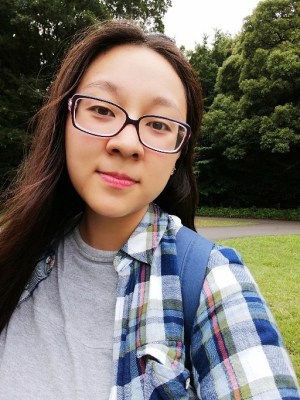
Hey! Say! Conversation Club: Online Challenge
Ms. Shakhida, thank you very much for agreeing to this interview. First of all, how did you get into "Hey! Say!"?
I have been a member of the club since its foundation. At first I was worried and couldn't understand, but around the middle of 2019 I became interested in running the organization. And at the end of the same year, I fully joined the management team. The shape of the club's activities gradually changed and we tried various ideas. In the past, each meeting had its own theme, but now it's a place for more free communication. Everyone can talk about topics of interest.
Then a pandemic occurred. The club was originally designed to communicate with each other, so the difficulty of converting communication to a remote format seemed to stall club activities. But thanks to the active participation of all the organizers, we were able to transform the club's activities into a remote format. By using zoom meetings and its session rooms etc. Of course, it was very hard at first. Both technically and systematically. But by the time I got used to it, not only from HSE and Moscow, but also people from all over Russia and the world started to participate. Japanese people in Japan also got to participate.
You talked about club activities during the pandemic which I had intended to ask. 😊 Let's continue. You said that Japanese people have started to join the activities, but I remember Japanese people came to a face-to-face club meeting in Moscow.
Yes, I was very happy. We knew everyone had things to do and the time difference was big, so we invited them to the party without any special expectations. However, I was very happy that a student from Akita University who had come to HSE as an internship participated.
Why are you still active in the club after taking your bachelor's degree?
I didn't want to leave the club from the beginning. Everyone was interested in club activities, but no one wanted to be an organizer. I didn't want to lose what my seniors left. It is because basement of activities just like the audience, contacts, and upcoming events (Including joint events with Musubi Club) were already organized. We also held a bilingual event with Japanese people. It was tough, but I felt it was worthwhile.
I'd like to ask the question I was going to ask in the interview. When all of us, students and teachers suddenly went online, it was very difficult. Every situation has its pros and cons. What are the advantages and disadvantages of online? Please tell me from the standpoint of both organizers and participants.
About the demerits. First of all, it's the technical part. It was hard to coordinate large numbers of people in online meetings. For example, if you have a meeting with several tables and you find that the conversation is not done at one table, you can rearrange the participants or ask questions to encourage the conversation, but it is very difficult online. You have to move back and forth between rooms, and if you find a room silent, you don't know if your entry interrupted the conversation or if the participants were silent all the time. In addition, the unstable Internet, cameras, microphones, family, pets, and so on, can be very distracting. In particular, if they are not yet proficient in the target language and they are not confident, technical problems can be very distracting and make it difficult to continue communicating. In addition, without physical communication, many people become frustrated and embarrassed. These problems are felt especially from the perspective of the organizers. It's much harder to get people together and organize gatherings.
On the plus side, the club is growing. Many participants from various countries around the world are participating in our gathering. You do not need to order a pass to HSE in advance. In the past, there were people who did not register the participation in advance and the security didn't let them enter the school. There is no problem with the pass now. 😊 People of various ages began to come. They are both high school students and pensioners. I'm very happy about this. From an organizational perspective, it's easier to find time for gatherings. I found Sunday convenient for many people, so I held the gatherings on many Sundays all over a year. I don't have a job or study, so don't need to hurry on Sunday. Also, the number of participants online increased a little.
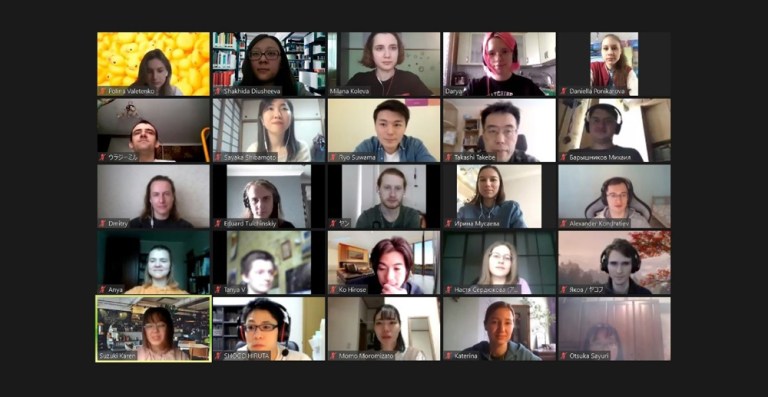
That sounds convenient. You can't enter HSE on Sundays unless you have special permission.
It is very convenient in that sense.
The next question may be a difficult one, but I would like to know your opinion. What is language learning in general? It’s communication studies. And, of course, there has never been a period of isolation without communication for such a long time. Of course, there are now an incredible number of ways to communicate and it seems to me that more and more people are being "digitization". People are less likely to communicate even by phone. Testing of interaction is spreading. We also learn languages in the old way, assuming that students communicate verbally with native speakers in a variety of situations. On the other hand, everyone continues to communicate, but the form is changing. I mean, we don't actually see each other. If you don't see the most part of non-verbal information such as facial expressions and body movements, which used to help you the mutual understanding when we don’t know the language well, so you can't use that information. How do you think this will affect communication?
It seems to me that we need to return to the old form of physical communication as soon as possible. Some of the feedback, or some of the emotion, seems to be lost. These gatherings disregard emotion. The challenge is to make online meetings more vibrant. It is obvious that Japanese language learners want to interact with Japanese people. But that's not enough. People need emotional nutrition. Through cables, emotional connections weaken and people begin to be tired of each other. We ever did some kinds of activities at the gathering: making postcards and playing with them. This is not possible at the moment. Everyone wants to do personal interactions like shaking hands, hug, touch each other and sharing cookies.
I agree with you on this matter. The gathering will be held as usual in April. What are your plans for the future?
I am concerned about the face-to-face format. I'd like to hold a face-to-face event, but of course I need Japanese people. However, it is very difficult to gather the necessary number of Japanese participants because Japanese cannot come to Russia yet. Of course, the Russians will come. I'd like to have a face-to-face gathering in mid-May, so I'm asking all the Japanese I know now.
These are temporary difficulties and I hope we still get back to normal life. Ms. Shakhida, thank you for the interview! I'm looking forward to seeing you in person!
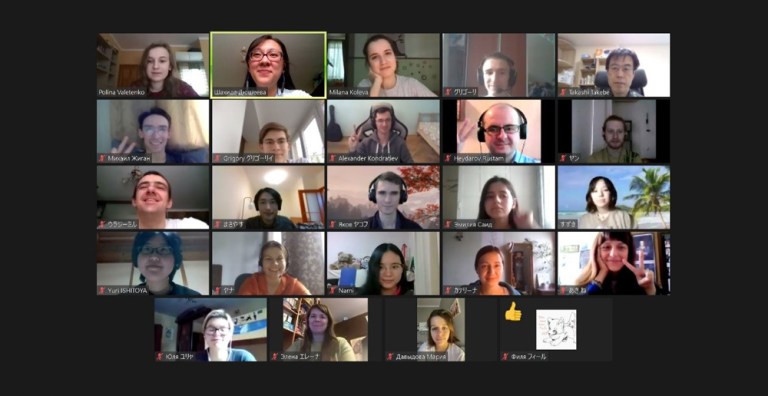
February Activity Report
28 February 2021
Global Japan Office Coordinator
Yulia Korovina
Hello everyone!
As you may know, the coronavirus pandemic is having a serious impact on higher education systems around the world, including internship programs. Internships are the most important part of the educational process not only to improve language skills but also to learn about the country of the language of interest. In the Japanese Language Department of the Faculty of Oriental Studies, several students went for internships every spring or summer. However, all spring and summer internships were canceled last year. Nonetheless, several students were somehow able to participate in the autumn internship. We decided to ask them how they got to know more about Japan during the coronavirus pandemic.
Talk “Understanding Japan in the Coronavirus Era”
I spoke with three fourth-year students of the Oriental Department who had just returned from an internship at Tokai University in Japan. The internship turned out to be very unusual. For the first 2 months, the students studied online from Russia, then went to Japan when traveling was possible and studied in Japan for 2.5 months. In fact, this was also online.
Interview Participants: Yulia Korovina (YK), teacher of Japanese
Maria Timonina (MT), 4th grade, “Eastern societies and cultures” course
Anastasia Degtyaryova (AD), 4th grade, “Eastern societies and cultures” course
Irina Kutsenko (IK) 4th grade, “Politics and economy of Eastern countries” course
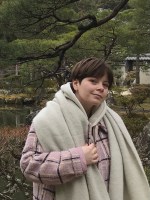

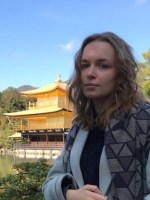
Maria Timonina / Anastasia Degtyaryova / Irina Kutsenko
YK: Thank you for agreeing to participate in this conversation. I know that you studied on the online program from Russia for two months and then left for Japan. Please tell me how you studied online. And how did you continue to study after you arrived in Japan?
MT: In fact, studying online in Russia and Japan wasn’t that different. The only thing was the time difference. Lucky for me, I was able to submit my assignment a little late in the course I took. Certainly, I had to get up in the middle of the night to be in time for the first class. The teacher recorded a part of the lecture so I could watch it later. Most of my courses were lectures, and there were hardly any face-to-face seminars.
YK: You mean there was no group work or communication with classmates?
MT: Very few. Except for Japanese classes. The class was similar to that at HSE. The teacher tried to get everyone to participate, but this class was only once a week.
AD: The conduction of online classes was excellent. I was happy that all the classes were conducted online and I was always able to devote myself to Japanese research. Overall, classes were structured to submit assignments within the day or within a week. I was able to spend my time freely until then.
IK: The main subject in our program was not Japanese. Compared to the Japanese class at HSE, there were less explanations of grammar. There were classes in the classroom and tests every week.
YK: Interesting. The next question is about languages. Was it your first time in Japan other than Maria?
MT: Yes, I was in Japan before I entered university, but I didn’t know the language at all.
YK: What did you think about your knowledge of Japanese? How do you evaluate 3.5 years of teaching at HSE?
MT: I was very comfortable throughout my stay in Japan. I understood almost everything: transportation directions, verbal conversations, classes and seminars. I think this is because of the language program we learned at HSE. That was wonderful. Even in Japan, the classes were remote, so I couldn’t actively practice the language as I wanted, but my knowledge was sufficient for traveling and everyday conversations on the street.
AD: On the contrary, I felt a little uneasy at first because I could not practice enough conversation with HSE. However, it was not difficult to listen to news or attend lectures or classes. Social and political translation classes were helpful here. It was difficult to understand advertisements.
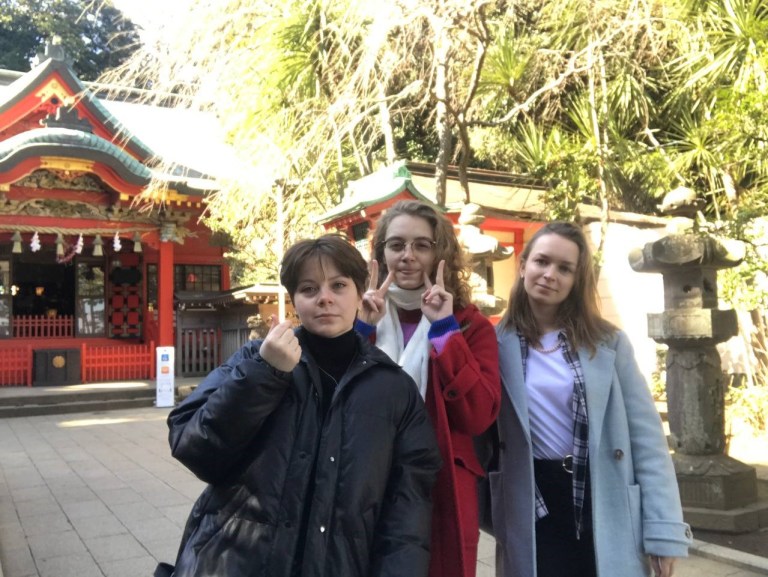
IK: I’m like Anastasia. At first, it was difficult to shop at stores because I wasn’t very interested in Japan until now. So this is my problem. I think our university teaches language very well. But I had a hard time studying during the lockdown period, so my Japanese level dropped a little. When we had the opportunity to compare language levels with other universities, we felt our level was very high.
YK: That’s great. Let’s talk about Japan. Your learning situation was unusual, but I hope you still had a chance to learn something. You were absorbed in the culture and language of this country and studied for a long time in order to go to Japan. And now you’ve finally gone to Japan. What do you think? What surprised you and what disappointed you?
AD: I have only good impressions. I have wanted to go to Japan since I was 11 years old. My expectations were not disappointed so it’s hard to give all my impressions in a short interview. Overall, however, I was impressed by the Japanese sense of responsibility. Everyone wears a mask and washes their hands. This really increased my respect for the Japanese. I was also moved by trusting people. Strict admission restrictions, turnstile ticket gates. And there are no metal detectors anywhere. The beauty of the traditional architecture and the high standard of living were also impressive. I was also able to visit several cities including Kamakura, Kyoto, Nagoya and Yokohama. I also went to Enoshima.
MT: The first time I went there, I felt blocked. I seemed to be looking at the surface, a very beautiful bright picture. Of course, the service in Japan is of the highest level. A culture of mutual respect was widespread, in sharp contrast to what sometimes happened in Russia. I am the same as Anastasia and think Japan is very beautiful. And not only traditional architecture, but also modern architecture. The difference is that the buildings are carved into the landscape. The buildings complement each other. The transportation system is incredibly developed all over the country. It is very convenient and you can get used to it soon. Even the packaging of goods has aesthetics. Beauty in everyday life is impressive and eye-catching.
IK: I went to Japan just to see how much I liked Japan. There are many stereotypes when it comes to Japan, but I wanted to see for myself. I really came to like Japan. Japan is infinitely diverse, and in this country, everyone can find something of their liking. I found that traditional culture was what I liked the most.
YK: Thank you! Last question. What do you think about your future studies or maybe your job?
MT: I want to get a bachelor’s degree and go to a master’s degree. It may be in Japan. I’ll think about it according to the situation.
AD: There is a before and after in my life marked by my stay in Japan. I realized my dream. Since I went to Japan, at first I didn’t know what to do next. In fact, this training gave me a lot of motivation. I’ve set a new goal. I will continue my research on Japan.
IK: Like many Japanese experts who decided to keep studying Japan, I will take the aptitude test. I am also thinking about master’s programs in various countries, including HSE master’s programs. I think it depends on the situation.
YK: Overall, I think this training has given you a lot of positive experiences. No matter what the situation is, I am glad that you came to Japan and were able to see it with your own eyes, not only through the eyes of the teacher or through animation. I wish you continued success in your studies, clear goals, and new dreams. And of course, I hope you can go back to Japan! Thank you very much!
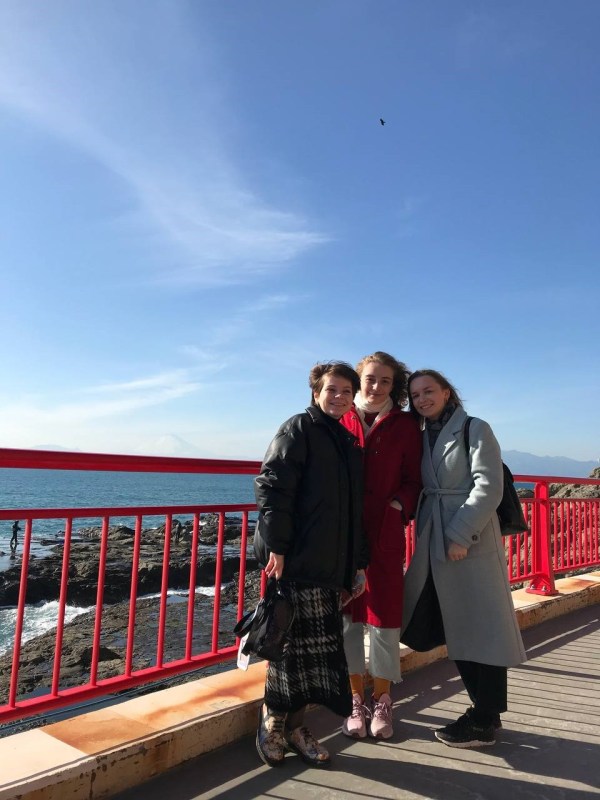
January Activity Report
31 January 2021
Global Japan Office Coordinator
Yulia Korovina
Happy New Year, everyone. I hope that the situation of coronavirus improves in the new year so that you are able to return to normal life as soon as possible!
In HSE, the new term started from the new year. But so far, most programs continue to be long-distance.
If you’ve ever read an interview to a student, you’ve probably noticed that most of today’s students learn about Japan through anime and manga, which are popular around the world, and that many of them learn Japanese because of the pop culture of Japanese youth. For students who “grow” studying historical, economic, political and other aspects of Japan, it is interesting for me to see how the motivation for learning Japanese changes and how their dreams change. So I decided to interview some students who are currently in their final year as well as their instructors.
Interview “The mission of Japanese experts is to become the bearers of culture in both countries.”
The first person to answer to our interview was Ms. Roli Jain, the Head of scientific-educational section of Japan studies, School of Asian Studies.
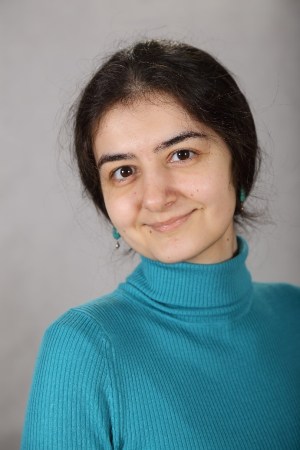
Ms. Roli, thank you for taking this interview. First, please tell me briefly how you came to know Japan and why you started learning Japanese.
Thank you very much for inviting me to this interview. In general, when I am asked why I learn Japanese, I answer “It was fate.”. I’m half Indian, my mother is Russian and my father is Indian, and I lived in India for a long time. I graduated from high school in India. I had no interest in Japan when I was in high school. When it was decided that I would enter a university in Russia, my father brought a brochure of Moscow State University. At that time, my father was teaching Hindi as a native speaker at the Institute of Asian and African Studies at Lomonosov Moscow State University, IAAS. I didn’t think about other universities at all. I read this pamphlet carefully and began to choose my future specialty, and I got rid of the bad things. Thus, the specialties of “Asian-African studies” and “linguistics” remained. I was also left with japanese. I deleted what I didn’t like (Chinese, Arabic, and other Oriental languages). I had never seen anime or read manga, and I didn’t know anything about Japanese culture when I entered school.
It’s interesting. And it’s quite unusual. As far as I know, you were able to start teaching Japanese as soon as you graduated from the master’s program. Why did you decide to become a teacher?
I decided to teach Japanese during the one year internship with the Ministry of Education, Culture, Sports, Science and Technology in Japan that I took during my third year. I happened to go to Waseda University, but this was also destiny. When I woke up one morning, I wanted to be a teacher. The impetus for this decision was the “treatment communication” course, in which students learned how to use honorific expressions. The course was very interesting and I was very impressed, so I wanted to teach like that. When I returned, I declared that I wanted to teach Japanese to all my teachers. Later, I was invited to teach at my alma mater. My first student was a Chinese who came to study at IAAS. After a while, in 2010, I transferred to the HSE.
Was the first student Chinese? I can’t believe it!
This is also fate!
Sure. Next, I would like to ask you about your current students. You are only teaching senior students now. Why did you decide to teach the 4th grade? What is the difference between teaching junior students and teaching senior students? What is the difficulty or conversely the advantage? What is fun and what is hard?
Again, I didn’t particularly want to teach seniors. It’s fate again. A teacher happened to quit his job as a senior teacher, so I ended up teaching instead of him. Since then, I really loved it. But I also like teaching lower grades. There are many charms there too.
Like what?
When I say something to a beginner, they always open their mouth and listen. Even to what seems to be something everyone knows, and everything is fresh, so I feel like I have actually become a great teacher. I can experience the moment when a first impression of a new culture or language is made among students. This is a very moving moment. In the higher grades, the students are growing up and know a lot of things by themselves. Sometimes they may say things I don’t know. I can talk with them on equal terms. For example, I have a translation class, but there are times when I don’t know how to translate better. We all discuss how to translate from the same standpoint. This is a completely different level of communication, and these life moments are very interesting to me.
Now let me ask you the next question. We all know that nowadays students come to universities to study Japanese, fascinated by the image of Japan depicted in manga and anime. And the motivation to learn a language is fairly simple. Students want to learn the language and culture, go to Japan, and get to know Japan and Japanese better. Are there any changes in the motivation to study if you are an upperclassman? Senior students may already know more about Japan and some students may have taken part in internships. Perhaps they will change their way of thinking about Japan. What do you think?
Well, this is my subjective view, but in fact, I can say that the motivation of the students is divided into several groups. There are people who want to work for a Japanese company in Japan or Russia, or who want to get a job related to Japan. Some people want to continue studying in Japan. There are those who want to continue research. Generally,, they go on to graduate school in Russia or go to Japan to continue their studies and research. There are not many students like me who want to teach Japanese. Also, there are always a few students who, while studying, decide that they do not want to associate their lives with Japan, but just want to graduate from university and get a diploma. So, of course, their motivation will change depending on their career path.
Yes, I understand. Finally, I would like to ask you, whether you wish to or not, we Japanese language teachers will lead students to the world of Japanese culture, and to the whole world of Japan, through the Japanese language. What is your mission? And what do you want from current and future students?
In fact, you answered the first question yourself. Guiding (becoming a guide) is my mission. In general, we only meet students for a very limited time and we don’t know how they live. So I think of the Japanese teacher as a mediator between two cultures, helping each student choose their own path. We can only point and suggest directions. Each one has to go their own way. And I really like the Japanese word “Sen-sei”. The Sen-sei means “be born before” so naturally we have a lot of life experience. Therefore, I would like to use this experience to support half-baked students. Sometimes let them learn from my work tools so they don’t repeat my mistakes.
And I want the following. Now we all understand how the world can change dramatically. I am the bearer of two cultures and these changes are very intimidating to me. Now, each country seems to be making efforts for self-isolation. After 10 years of vigorous globalization, there are now slight setbacks and some countries are now looking for greater isolation. This is seen in Brexit, as well as in American, European and Russian politics. And I am totally opposed to it. I will not exist if I am isolated. I am the bearer of two cultures and I cannot cut myself in half. In fact, when you start to learn a foreign language and study a foreign culture more deeply, you really become a bearer of two cultures. You discover a new reality, a new universe. And you create a new cultural identity and change yourself as a person. And my wish is to have such bearers. My wish for all of you, not just students, is to learn a foreign language, learn a foreign culture, and openly accept a different culture. Don’t be confined to your own culture. That kind of confinement ultimately leads to fascism and the destruction of relationships between people. Let’s not do that.
Roli Sensei, thank you for such an amusing and deep interview!
December Activity Report
31 December 2020
Global Japan Office Coordinator
Yulia Korovina
Hello everyone!
Our online life continues. HSE’s December is quite short because the test period usually starts around the 20th. For most undergraduate and graduate programs, tests were conducted online.
At the School of Asian Studies, we were able to hold a small but very comfortable event on the theme of Japanese poetry with Professor Alexandre Dolin of the School of Asian Studies, HSE.
ZOOM “a literary evening with Professor Dolin” (12/10)
We called this literary evening “2020 wrap-up: 5 poetry books published during the Coronavirus era”.
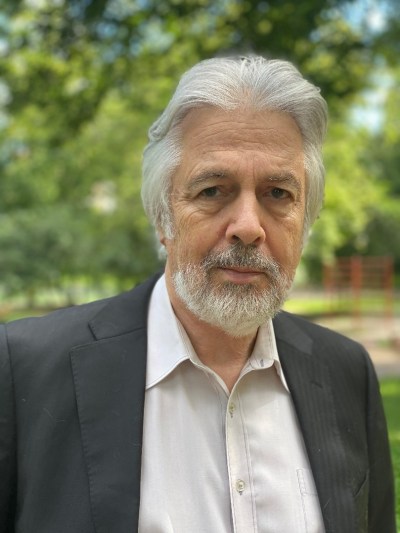
Professor Alexander Dolin is a famous Russian Orientalist, cultural scholar, writer and poet, and translator of classical and modern poetry and short stories. He has taught at Tokyo University of Foreign Studies and Akita International University for more than 20 years. He is the author of more than 70 books, including academic and popular science monographs, as well as basic research on Japanese poetry and poetics. The number also includes translations of many Japanese poems from ancient to modern times, including translations of the anthology from the 10 century “Kokin Wakashu (Collection of Ancient and Modern Japanese Poetry)”. He is currently a professor in the School of Asian Studies of the HSE and teaches Japanese literature.
During the coronavirus outbreak, Professor Dolin prepared and published 4 books (anthology of classical Waka), and prepared to publish his 5th book of poems in various languages about Japan, Europe and Russia. Anthology features medieval Buddhist poetry, early medieval Waka, Waka from the 7th -16 century, and modern Tanka, Haiku, and modern poetry.
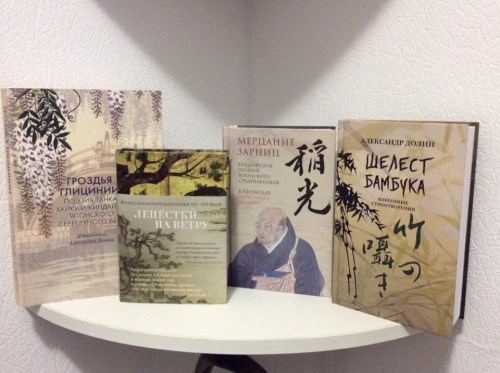
We talked with Professor Dolin about how he succeeded in publishing so many books in a relatively short period of time, and how creative and academic activities during the COVID-19 restriction period are generally different. In addition, the professor told us about his new book in great detail. He talked about the principles on which they chose poetry for the anthology, what Buddhist medieval times meant, and why it is of interest to modern readers.
Also, the professor’s life in Japan came up in the conversation. Prof. Dolin talked about how his remote life in Akita during his time at Akita University had influenced his worldview, academic research and creative life.
At the end of the evening, he talked in detail about the popularity of Haiku in Russia and around the world. He also talked about Haiku competitions and their translation into foreign languages. Throughout the evening, Prof. Dolin read several poems from his translated poetry and some of his own.
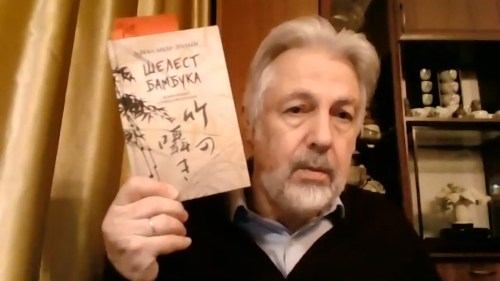
Finally, the auditors were able to ask questions. The meeting was so interesting and cozy that some of the auditors hoped to repeat the event next year. Professor Dolin agrees, and I surely hope this type of event will be held several more times.
November Activity Report
30 November 2020
Global Japan Office Coordinator
Yulia Korovina
Hello everyone!
On November 16, the HSE was forced to go back online again, and almost all students and teachers went back to zooming. The restriction will continue until the end of this year.
Although there is some fatigue that comes with virtual life, we continue to hold events online and attract many participants.
“Chugi Shiki” (11/27) for freshmen in the Department of Japanese Studies
On November 27, the Japan Club “Musubi” held one of the most important annual events that has already become a tradition of the Japanese department. This is a symbolically ‘given’ event for freshmen, which can be said to be a “baptism” for future Japanese scholars. The purpose of the event is to introduce new students to teachers of the Japanese studies department and make them feel like members of a large, friendly family of Japanologists. Thanks to the online format, almost all first-year Japanese students and many teachers were able to attend the meeting.
At the beginning of the meeting, Professor Uliana Strizhak, Head of the Education Program “Orientalism”, and Roli Jain, Head of the Department of Japanese Studies, gave a welcome speech.
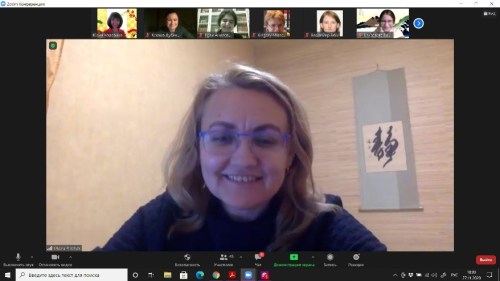
Furthermore, we wished for teachers from various fields to share wise advice and instructions along with good fortune and courage to the students who will become experts in Japan.
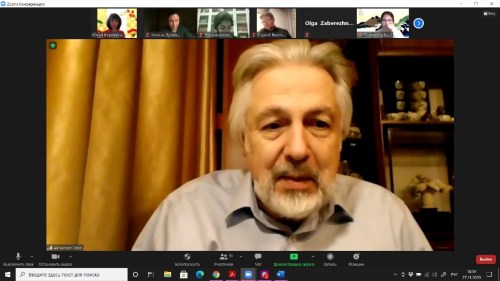
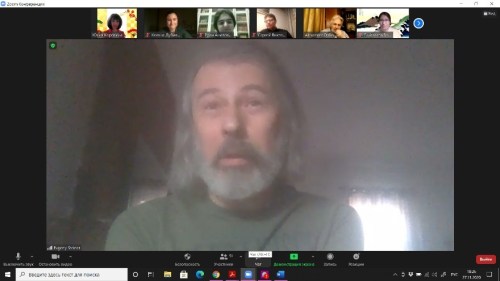
After that, the senior and the graduates gave a short presentation. We discussed internships at various Japanese universities hosted by the Faculty of Oriental Studies, and shared our impressions of not only the training courses but also the overall stay in Japan. Then the fun part of the night began. The club members prepared various activities for the new students. Everyone took part in quizzes on Japanese culture and history, folded origami and tested their knowledge of Katakana by guessing how to read foreign words. The evening ended in a friendly atmosphere.
The event was held in a very warm and friendly atmosphere. Many students left excellent comments and thanked the organizers of the event. The only thing we can do now is hope that they will do their best to learn Japanese and learn about Japan. And of course, do your best during the test period!
“Yukari” Online Lecture Room (11/28-29)
On the last weekend of November, the Oriental Department held a unique event called the “Yukari” online lecture. This is a project launched by students from the oriental department and Japanese course students from HSE High School who created it all together with students from other Moscow universities. The project participants loved Japanese history and practically held their own lectures on the main theme of Japan in the Edo period.
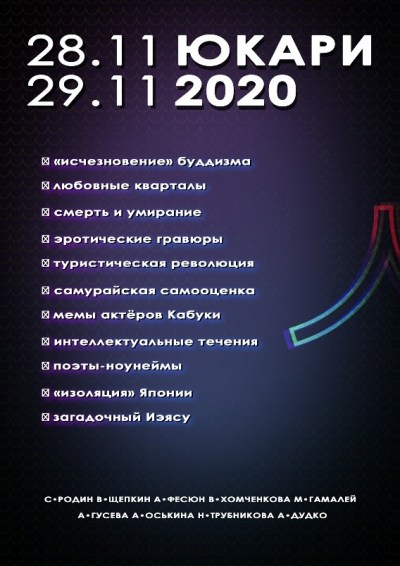
Initially, the lectures were scheduled to be held in the HSE Oriental Lecture Room, but due to new restrictions, the entire event had to be moved to a fully online format. From November 28, 2020 to 29th, 11 online lectures were held by teachers and employees from major science education centers such as the School of Asian Studies of the National Research University Higher School of Economics, the Institute for Oriental and Classical Studies, the Institute of Asian and African Studies, Moscow State University, the Institute of Oriental Studies of the Russian Academy of Sciences, and the Russian Presidential Academy of National Economy and Public Administration (RANEPA). Thanks to the support of the Faculty of World Economics and the Faculty of World Politics, all the lectures were free.
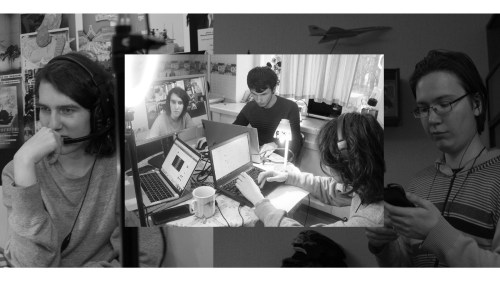
The themes of the lectures were really diverse. Based on original texts from the Edo period and modern scientific literature, the audience learned about travel, woodblock prints, interactions with the outside world, intellectual trends, Buddhism and samurai, the image of Tokugawa Ieyasu in postwar Japanese society, Haiku, the view of life and death, and the 17 -19 century entertainment district of Japan, Yoshiwara and kabuki.
In 2 days, about 1000 participants “gathered” at various venues including Zoom and VKontakte (Russia’s largest social network) for the lectures. The total number of views exceeded 35,000. These figures show the continuing interest of Russian audiences in traditional Japanese history and culture.
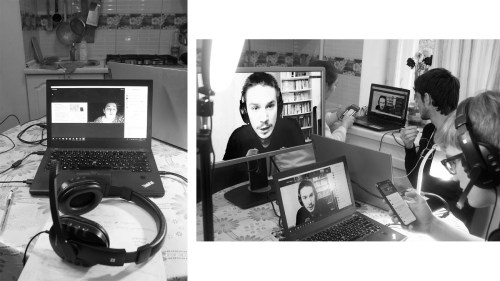
In addition to the lectures, the audience was able to participate in a competition. They were asked to write an essay on the theme of “One day in Edo” based on the lecture materials. The results of the competition will be announced on December 6.
A lecture is scheduled to be held next year. I wonder which historical period will be chosen by the organizer next time?
YouTube: https://www.youtube.com/channel/UCurbgXpBpJ_Ovx96rfNswsA/featured
VKontakte: https://vk.com/yukarium
October Activity Report
31 October 2020
Global Japan Office Coordinator
Yulia Korovina
Hello everyone!
Here at HSE, although there are significant limitations (due to COVID-19), we are continuing to conduct classes offline.
Japanese Language Study Group in the “Oriental Languages” Additional Language Program
October is when we commence a number of additional education programs in all HSE departments. And this year, despite the severe virus situation, the School of Asian Studies has formed a group of enthusiasts who want to learn Japanese. On October 13, the classes successfully started.
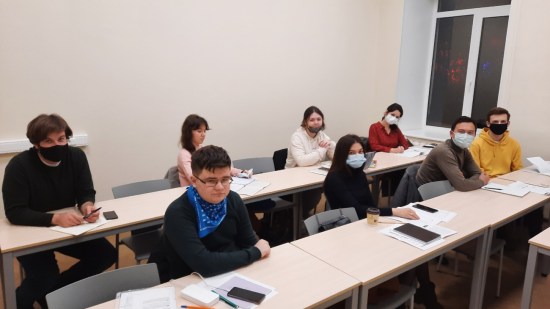
Of course, whenever I meet new participants, I ask them why they decided to study Japanese. If they’re a freshman, the answer is pretty predictable. Many of them were absorbed in anime and chose a specialty that required knowledge of Japanese. It is always interesting to find out the real motivations for students from other disciplines, graduates from various universities, and working people who have decided to study Japanese. After all, their interest does not just stem from their love of Japanese animation, but their longstanding determination to acquire new language skills and willingness to devote time (and money) to challenging activities outside of their own work. It seemed to me that the answers from some of the participants in the Japanese group of the “Oriental Languages” additional educational program deserved to be known.
Aisha Ezbeeva, first-year undergraduate in the “Foreign Languages and Intercultural Communication” program
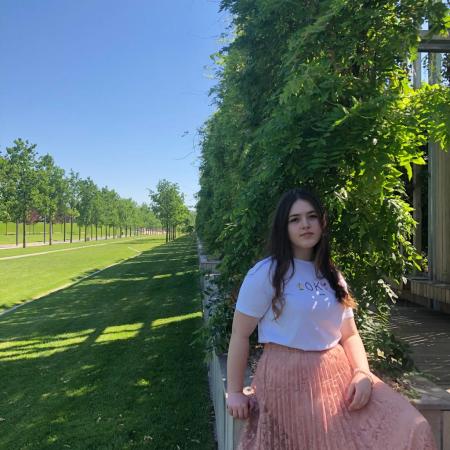
Hello! My name is Aisha. I’ve been studying Japanese for almost two months and I’ve been improving. It may sound mediocre, but I’m here because of anime. Japan has been at the top of my list of places to go for two years now. I am told that I shouldn’t expect too much so that I am not disappointed, but I think that Japan really matches my personality and view of life. I will definitely be able to visit this beautiful country someday. In the meantime, I will put time into learning this very complex and beautiful language.
Anna Afonasieva, HSE alumnus, Economist
I dream of living in Japan for a while. I came to the HSE course because I want to learn the language and gain a little more confidence. The lessons are very convenient because they are held at night on weekdays. After graduating from university and working for several years, I gradually developed an interest in Japan. I really like reading Haruki Murakami’s books, eating sushi and listening to online lectures on Japanese culture and history at night. (I especially like the lectures by modern Russian Japanologists Alexander Mesheryakov, Anastasia Sadokova and Alexander Ravskiy.) Also, I am crocheting a little using the Japanese amigurumi technique, so I am excited to be able to translate the knitting magazine I use and make some new additions soon!
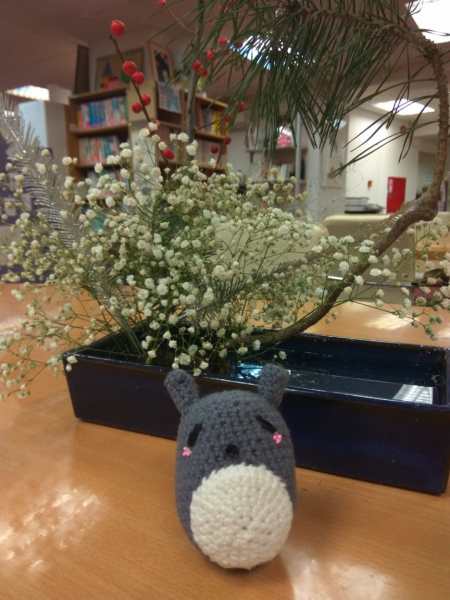
Anastasia Gruznova, Art critic
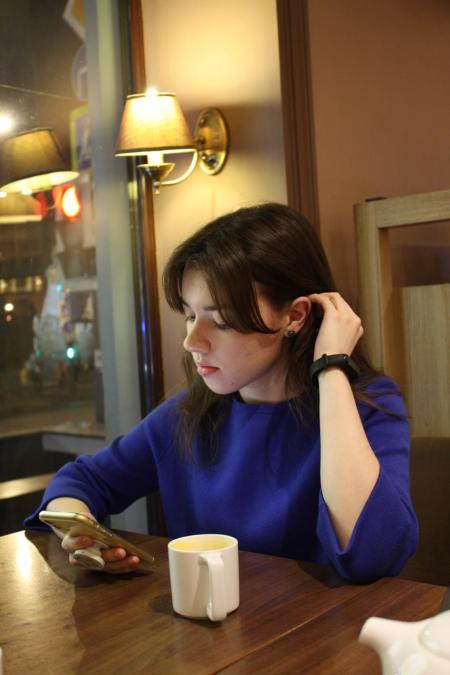
My name is Anastasia. I am an art critic and work in the field of restoration and inspection of ceramic art. My encounter with Japan was an East Asian art course I took at university. I wasn’t really interested at first. But I liked Japanese architecture, pottery and, of course, ukiyoe. I once read an excerpt from a book called “The Japanese Discovery of Europe by Donald Keene”. The viewpoint presented in this book – “a familiar culture through the prism of different perceptions and completely different traditions of the world” – really moved me, and this led me to study Japanese art.
One of my first jobs after college was to write an academic paper on the restoration of Japanese porcelain. I read about the center of Japanese porcelain production, translated excerpts from the Kojiki, learned about symbols of Japanese art, and searched for documents on lacquer ware and metal fittings. I wanted to learn not only about the history of Japanese ceramics and porcelain, but also about the culture of this country. Learning a language is my first step to gaining new knowledge.
Kirill Ryabkov, Entrepreneur
My name is Kirill, but I am called “Kira” in Japanese.
Three years ago, by sheer coincidence, I started studying Japanese. When I passed a building with an unusual sign that said in Kanji “Sakuraka-juku”, I found out that it was a Japanese language school. I actually took some lessons out of curiosity. I had no language learning skills, so I had never thought about studying one until then. And at my age (31 years old), learning a language is generally an unproductive task and takes a lot of time. It’s not my job and it’s not going to be my job. But thanks to the teachers I had at the beginning, even though I always had to catch up with my younger classmates, I was able to proceed with my studies. In the lessons, we played like children, joked and competed with each other. It was a great change for me, as someone who was always held responsible for their employees.
After spending two and a half years like this, I had to give up studying Japanese and do my best to protect my business because of COVID-19, and unfortunately the school was closed. However, I remember promising my teacher that I would not give up Japanese until I passed N4 of the Japanese Language Proficiency Test, and I will keep my promise. That’s why I have decided to attend this course at HSE. And one day, I want to meet my teachers again and thank them in beautiful Japanese for helping me find a new hobby in my tedious everyday life. I hope my new teacher Yulia will help me with this!
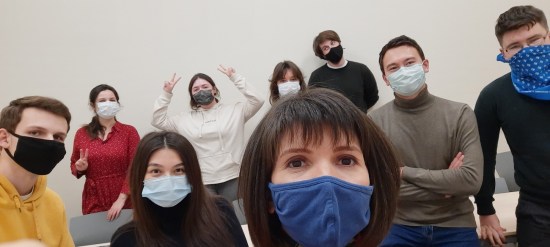
September Activity Report
30 September 2020
Global Japan Office Coordinator
Yulia Korovina
Hello everyone!
National Research University Higher School of Economics (HSE) kicked off the new semester on September 1.
After closing down the school for almost six months, most teachers and students are finally able to enter their classrooms on campus. Teachers over 65 and foreign students who have not yet been able to enter Russia remain online. In addition, all HSE campuses have significant limitations. When you are at school, you must wear a mask and socially distance yourself 1.5 meters away from others. As the number of students attending a single class must be less than 50, large classes are now held in a mixed format (online and offline) or students are divided into groups. The most important and unfortunate restriction of all is that all extracurricular activities are prohibited under the president’s special order. This means that among many projects, student organizations, clubs, conferences, seminars, and other events can only be held online.
This restriction applies to all clubs in the School of Asian Studies, including clubs in the Japanese department.
I’m thinking about what kind of event we could hold this Fall, but let me tell you a little bit about the freshmen first.
Freshmen in the Japanese Language Department: What kind of students are they?
This year, 45 people enrolled in the Japanese department despite fears of a decline in the number of first-year students. We receive almost the same number of applications every year. It is worth noting that for the first time, the number of males and females was almost equal. This year, the male students have been divided into four different language groups, with 20 in each.
There are 12 students in my group. Every year in the first lesson, I ask the students why they are fascinated with Japan and why they decided to study Japanese. As usual, most people answered that it was because they watched anime and read manga when they were children and that this was the reason they got to know more about Japan. Some other answers really stood out to me. One student told the class that a few years ago she became interested in Japanese literature. Works by writers such as Natsume Soseki, Abe Kobo, Tanizaki Junichiro and Mishima Yukio, as well as more modern writers such as Murakami Haruki and Yoshimoto Banana, aided her in understanding Japanese culture and the psychology of the Japanese. She wants to be able to read the original works of her favorite authors. Another student is writing a book and is interested in the individuality of Japanese music, sports, and art, and wants to gather information in Japanese about Japanese athletes, musicians, and actors. One student is interested in the details of Japanese management. He wants to work in Japan and experience firsthand the mechanisms of Japan’s management system. Another student with bright pink hair told us that she enjoys drawing, and that she wants to learn how to draw real manga.
After class, we went to a cafe to get to know each other in a more casual setting.
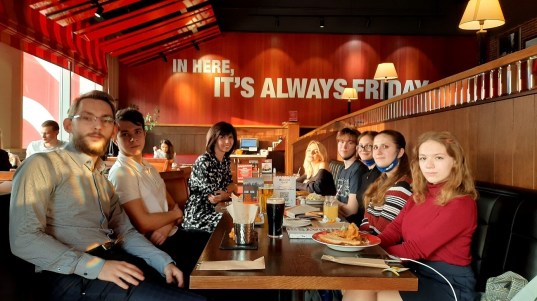
Of course, everyone said that they would like to go to Japan and see the reality of what they have learned from anime and manga. They also shared their expectations for studying Japan at the Faculty of Oriental Studies.
Recently, a different wave of interest in Japan has been hitting Russia, especially Moscow. We are already used to the various cafes and restaurants that serve Japanese food. Every year, with the support of the Japanese Embassy and the Japan Foundation, many events, festivals and exhibitions are held on the themes of Japanese tradition and modern culture. Recently, not only are there fiction translations on the bookshelves at such events, but there are also non-fiction books that explain how to clean an apartment, how to train memory, or how to raise a child like a Japanese. In other words, the increase in opportunities to learn about Japanese culture, a culture that seems so far from us, has made it possible to feel closer than ever to Japan.
I was even happier to learn that many students are interested in understanding Japanese politics, what role Japan plays in world politics and the world economy, the reason for Japanese longevity, and how Japanese solve social problems. The students are eager to make use of their studies and test their understanding in joint ventures and social enterprises in Russia. They hope that their studies will not only help them master the language, but also help them become true experts in the difficult discipline they have chosen.
I wish them patience, confidence, and the best of luck. May your dreams come true!
August Activity Report
31 August 2020
Global Japan Office Coordinator
Yulia Korovina
Hello everyone!
This summer, due to measures to prevent COVID-19, students from the School of Asian Studies were unable to travel to Japan for internships. Fortunately, a few students were able to participate in a great online project. I was able to gather some feedback from them that I would like to share with you.
Online TUFS Japan-Russia Summer School 2020
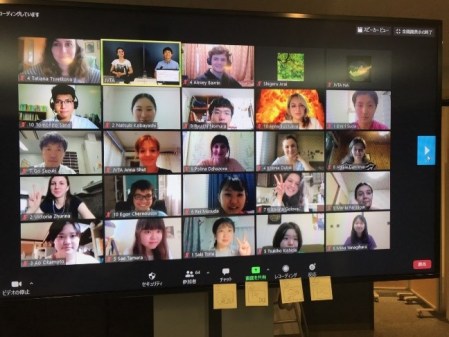
From July 27 to August 7, 2020, Tokyo University of Foreign Studies hosted the “Online TUFS Japan-Russia Summer School 2020”.
For two weeks, the students cooperated with each other and learned about the cultures of both countries, while improving their Russian and Japanese skills.
As part of the program, Russian students not only improved their Japanese conversation, reading and writing skills, but also had the opportunity to listen to a lecture on inbound tourism to Tokyo from Mr. Denis Morozov, manager of the inbound department at JIC Travel Center. Students were also able to attend a lecture on Japanese literature by Ms. Maria Prokhorova and also participated in a subtitles translation workshop by JVTA (Japan Visualmedia Translation Academy).
Feedback from the students of the School of Asian studies
●Shakhida Dusheeva, first-year master’s student majoring in ‘Socioeconomic and Political Development of Modern Asia’
Thanks to the summer school hosted by Tokyo University of Foreign Studies, I was able to practice Japanese in a very interesting and useful way during what I thought would be a boring summer of isolation. In addition to tandem language learning, the lectures in the program were very informative and really interesting. I was able to see Japanese literature from a different perspective, and feel even more enthusiastic about reading Japanese now. It was a pleasure to make friends with both Japanese and Russian participants, despite the limitations of being online. In two weeks, I was able to achieve all the goals I had set when I enrolled in the program – improvement in pronunciation, reading speed and comprehension of Japanese text. I would like to thank the program organizers for making everything run so smoothly.
●Tatiana Tsvetkova, third-year undergraduate student majoring in ‘Oriental Studies’
It is difficult to express the joy of these two weeks in words! I was a little tired of 4 months of online Zoom learning at HSE, but the 3 ~ 4 hours of tandem learning a day went by so quickly. For me, participation in this program was a good opportunity to push myself to overcome the language barrier. (In fact, it was extremely effective.)
In addition to language learning with my Japanese partner, I was able to attend many wonderful lectures. For example, thanks to the experts, I felt like I took a trip to the world of modern Japanese literature. The lecture was in Russian, but because the lecturer repeated all the basic information in Japanese, I was able to write down useful terms such as “pure literature” and “popular literature” and practice reading the names of Japanese writers.
Another unique experience was the subtitles translation workshop. We created Japanese subtitles for the Soviet comedy movie. I will never forget this!
I am very grateful to the organizers and teachers for this elaborate program, their careful answers to our questions, and consideration to make us feel comfortable.
●Sofia Obyedkova, third-year undergraduate student majoring in ‘Oriental Studies’
As you know, the borders are closed because of the virus, and during the class, there were several problems specific to this year’s shift to online education. However, the organizers were responsible and worked hard to recognize the problems and tried hard to solve them to make the language learning process as effective as possible.
I was very happy that the organizers and teachers created a comfortable and friendly atmosphere for the learning process. There was no time to feel sleepy, as the lectures encouraged me to become familiar with modern Japanese literature. By communicating in a quiet environment in a small group, I was able to completely concentrate on my thoughts and what my classmates were saying without getting distracted.
In addition, I was very happy to have been able to participate in the subtitles translation workshop. We had an interesting discussion on the proposed translation of part of the famous Soviet film and the Japanese anime. I was also able to have relaxed conversations with Russian and Japanese students. These were the most memorable parts of the program for me.
Unfortunately, I was not able to make any Japanese friends, but as someone that suffers with language barriers it was an extremely valuable experience for me.
●Maria Timonina, third-year undergraduate student majoring in ‘Oriental Studies’
I am glad that I was able to participate in the tandem language learning program. During this intense two-week period, I was able to meet many passionate and creative people who not only helped me improve my skills, but also inspired and motivated me. I heard most of the information for the first time, so the lectures were very interesting. And it’s great to get a perspective on topics that don’t get much coverage in the classroom “from the inside”. In the literature lecture, I came to the conclusion that there are quite a few modern writers whose works are worth reading in order to better understand the characteristics of the Japanese mentality and to rediscover familiar aspects of life. From the valuable experience of attending this summer school, I decided to work harder and set new goals in my language learning process. I also found that positive awareness and confidence helped me learn from my mistakes and improve my language skills.
●Ksenia Dubik, third-year undergraduate student majoring in ‘Oriental Studies’
After finishing the online summer school, I’ve made great personal progress.
First and foremost, the program taught me not to doubt my knowledge and not to be afraid of mistakes. Mistakes are the norm for learning any language. I understood this from the process of communicating with a Japanese student studying Russian and helping them correct their mistakes. Learning a language is tricky, but it is important to never give up, talk, challenge yourself, ask questions, and finally admit that you have room to grow. I was especially made aware of this way of thinking from my diligent Japanese classmate.
In this program, I not only practiced the language, but also listened to various lectures, and learned about the possibility of utilizing my knowledge of Japanese in the future, and was able to become aware of new fields in which I would like to work someday.
I am very happy to have been able to participate in such a wonderful program. I learned a lot, gained interest in many things, and was able to make new friends. The first few days of the class were technically challenging, but the summer school moved forward without many problems and allowed everyone to discover many useful and interesting topics.
●Ekaterina Vasenyova, third-year undergraduate student majoring in ‘Oriental Studies’
Participation in the tandem language learning program was probably the best experience of this summer. At the end of my third year, I realized that I was afraid of making mistakes, which was my main barrier when learning Japanese. At this summer school, I was able to rethink my approach to language learning. In tandem language study, students communicated with Japanese about a given topic, and sometimes discussed topics beyond the scope of the subject. I have met some Japanese friends and have been communicating with them since summer school. I became confident in my abilities, and this “psychological” barrier disappeared. It was only two weeks, but through regular communication, I was able to notice specific progress.
In addition to tandem studies, I would like to emphasize the value of the lectures and workshops we participated in. In all honesty, they were all clear, interesting, exciting and useful at the same time. After each lecture, I felt an energy explosion. Considering the recovery and further expansion of the tourism bubble between Russia and Japan in the future, I put a book by a modern Japanese writer on my shelf and figured out how to translate my favorite scenes from movies into Japanese.
In addition, by interacting with Japanese students through tandem learning and practicing the language and conversation, I became aware about the reason why various ways of thinking about my country and its culture exist and the possibility of changing that way of thinking.
Overall, my language ability and motivation really improved as a result of the course, and I felt a desire to study more Japanese. I learned new words, read, listened, talked, and learned new things about Japan. I am very grateful to the School of Asian Studies for giving me the opportunity to participate in the program, and the organizers of the summer school for their experience and knowledge!
●Mikhail Zhigan, third-year undergraduate student majoring in ‘Oriental Studies’
When I received an invitation to join the program, I quickly agreed, thinking of all the Japanese people who left Moscow this summer. During the two-week program, the lectures were filled with time for speaking with native speakers. The first lecture on inbound tourism to Japan focused on the Russian market with its many characteristics. In the second, the lecturer introduced me to modern Japanese literature that are barely known in Russia, and the lecturer spoke very interestingly about their themes. Even I, as someone who is generally uninterested in fiction, became interested in some of the works. But the most interesting day for me was when we had the opportunity to translate subtitles. In general, I can say that I have enough experience in Japanese translation classes in university. As I had expected, working with materials that were not intended for translation was particularly exciting, especially as the organizers chose animation scenes for works to be translated into Russian. Overall, the summer school was interesting, but most importantly, it was one of the happiest experiences of the summer.
July Activity Report
31 July 2020
Global Japan Office Coordinator
Yulia Korovina
Hello everyone!
The HSE student and faculty vacations have started. Unfortunately, due to the coronavirus outbreak, we will not be able to take holidays abroad this summer. Students are unable to attend summer school or internships, and teachers are unable to attend academic conferences or seminars. However, everyone will do their best to stay positive, attend online events and enjoy their holidays within Russia.
We decided to share another story about the journey towards becoming an expert in Japan. Ms. Darina Bunkova, one of the most successful graduates of the School of Asian Studies at HSE and current employee at the Japan Association for Trade with Russia & NIS (ROTOBO), shared with us her relationship with Japan.
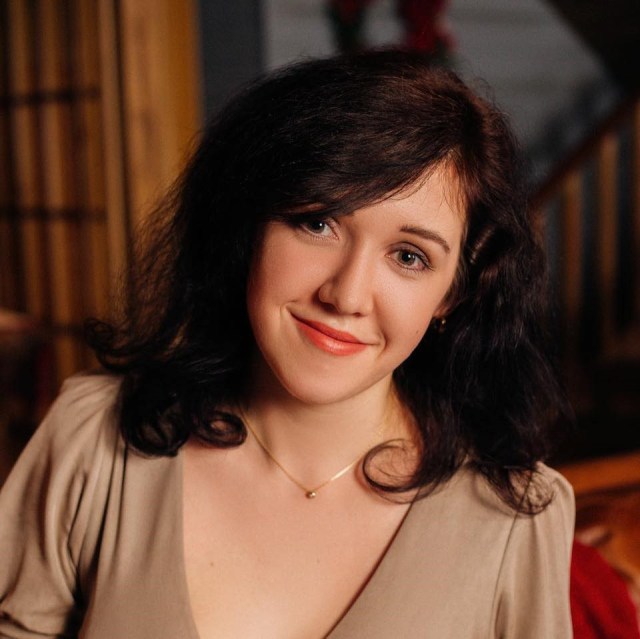
My Japan
I learned about Japan when I was 13 years old. I liked watching anime, and in Russia, Japanese anime was shown on television from 15:00 to 16:30 every day from Monday to Friday. When I received a DVD including Hayao Miyazaki’s anime collection as a New Year’s gift, I watched the movies undubbed with subtitles. That was the first time I heard the Japanese language. It drifted into my ears and its melody captivated me. Gradually I started wanting to speak this complex yet incredibly beautiful language myself. From that moment, I was interested in Japanese and also Japan as a country. Since then, I have watched Japanese movies and anime exclusively in their original versions.
The more I watched anime, the more I was exposed to traditional Japanese culture, history and everyday life. I started reading about Russian Orientalists and Japanese literature, and with each book I read, I discovered a new aspect of the “Land of the Rising Sun”.
In high school I learned about the profession of an Orientalist and since dreamed of working as a Japanese-speaking Orientalist and reporter. I wanted to convey my love and knowledge of Japan to people, and build a bridge between the two countries. When I was in tenth grade, I audited my first class with first-year students at the School of Young Orientalists, SYO. Thus, I was still in high school when I took my first class in Oriental Studies, but seven years later I finally got my bachelor’s degree as an aspiring professional.
The classes were rich in content and eye-opening. However, the language was difficult for me. I was never the best student in the group, but all the sentences I had learned, the kanji I had memorized, and the phrases and translations I was able to produce were a victory for me. However, I still needed to learn more Japanese, see Japan with my own eyes, and find my place in the relationship between Russia and Japan.
I was able to visit Japan three times while studying at HSE: twice as a volunteer in Hokkaido and Shiga Prefecture, and once as an exchange student at Chiba University. I had some amazing encounters, new work and study experiences, even did some crazy hitchhiking around the country, discovered so many new aspects of Japan and was able to truly test my language skills. Japan has continued to reveal its beauty and diversity to me.
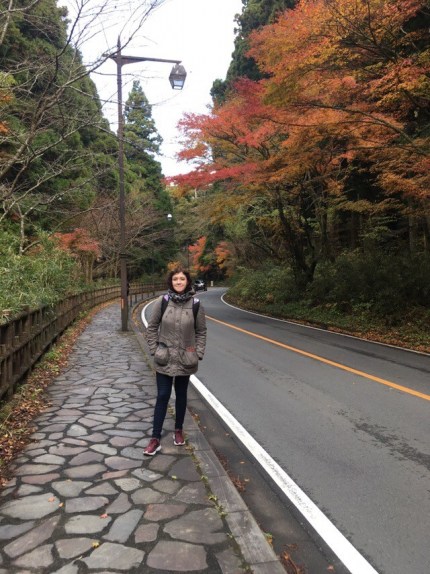
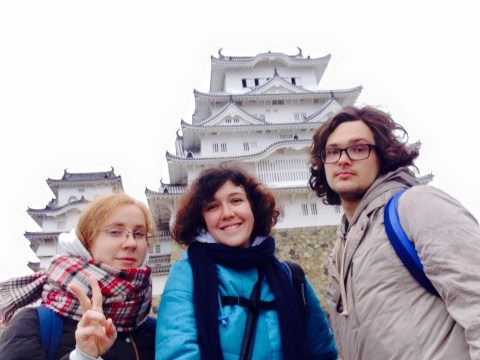
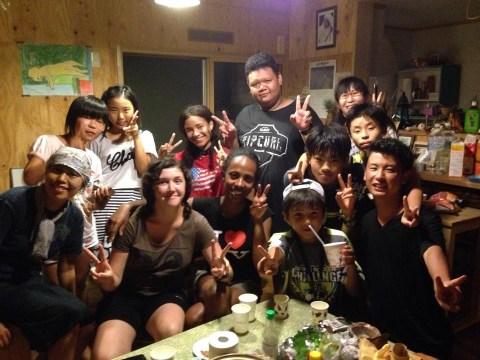
At the same time, it was difficult for me to be aware of my true abilities and desires in my studies. The more I studied, the less I understood who I wanted to be and how I could help others.
After I got my bachelor’s degree, I entered graduate school to get a master’s degree. During my two years of study, I participated in two more internships. The first was related to Mitsui & Co. products, and the second was a six-month study internship at the University of Tsukuba. After completing my master’s degree, I worked for a company that had nothing to do with Japan or Japanese. I worked as a project coordinator for renewable energy and electrical technology.
The job was interesting and different from what I had imagined when I was a student. I was surprised to discover a new field that had nothing to do with Japan. But I started to miss Japan. I began to remember how pleasant and interesting it was to be around Japanese people, who were always polite, considerate, humble and intelligent. Reminiscing about the wonderful scenery of Japan and the bustling streets of Tokyo, the sounds, smells and sensations, I decided to look for a job where I could use my Japanese, as I couldn’t bear being apart from it any longer. For almost one year now, I have been working for the Japan Association for Trade with Russia & NIS (ROTOBO), and as I had hoped, am helping to build bridges between Russian and Japanese businesses.
I am enthusiastic about communicating with both Russians and Japanese and cooperating with both sides. In any case, it is always exciting to see how people attract each other and seek common ground. My job is to help them in this search.
I don’t regret not working in my field for a while. I think it was a good experience, and the skills and knowledge I acquired will certainly come in handy in my future professional path.
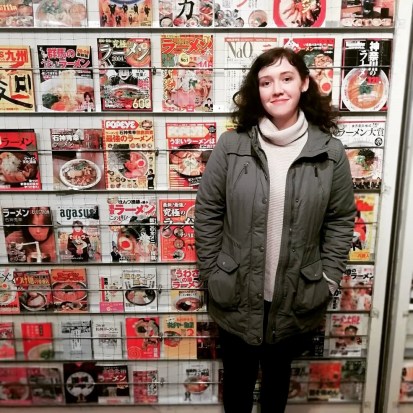
Currently, I am in another stage of “reconsideration” in my life, and I believe I will go through this process again and again for the rest of my life. I will change, Japan will change, and the relationship between me and Japan will also change, as did my love for Japan from being passionate and fervid, to a sensation of acceptance and deep respect.
But most importantly, Japan will always be part of me and will always be in my life. I am what I am now because of my studies in Japan and at the School of Asian Studies at HSE. Even if I were given the chance to turn back time and relive my life, I would still choose the path of becoming a Japanese expert all over again.
June Activity Report
30 June 2020
Global Japan Office Coordinator
Yulia Korovina
Hello everyone!
June is a busy time for HSE. There are Q&A sessions for exams and graduation theses. Since it is almost impossible to hold events, I would like to share with you some interesting stories about how my students became interested in Japan, and about students who decided to make their love for this wonderful country with its rich history and culture their full-time occupations.
At the beginning of the year, in life safety classes, freshmen are given assignments to interview a teacher from the School of Asian Studies. Students ask their future teachers how they became Orientalists. Choosing a job is often not as simple and easy as it seems, and sometimes the paths for Oriental major students to find their future specialty fields are just as winding and complicated. Ms. Diana Barieva, a Japanese language major, spoke about her experience and impressions of choosing a field from her first year of study.
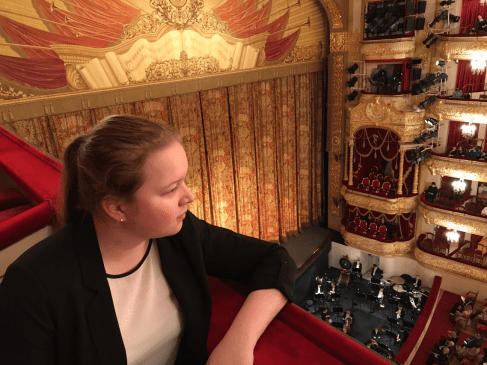
Why Japan?
For me, my love for the Oriental world probably began with my love for languages. Of course, in high school, like many of my peers, I watched anime and read manga, but it was only after I started studying languages that I decided I wanted to do work related to the East. When I was in grade 10, I began my journey with my first Asian language, which was Chinese. I know I chose to study Japanese at university, but I still have a special place in my heart for Chinese, so I am planning on continuing my studies in the future. When learning the language, I was always interested in the region in which the language is spoken, its culture and history. I learned new details about these people and their lives, compared my world with theirs and searched for some kind of connection between the two. You could say I fell in love with the process right away. As you know, China has a great influence on the cultures of its neighboring countries, so I found connections not only with Russia but also with India, Japan, South Korea, Vietnam and other Southeast Asian countries. In this way, my interest in one country’s language grew into an interest in the entire Oriental region.
Around that time, I started looking for opportunities to transform my hobby into a professional career, and that is when I came across the School of Young Orientalists, SYO. I didn’t want to miss my opportunity to be a student at this school, so I wrote a motivation essay and passed the selection process. While taking a one-year course at SYO, I gradually became aware of what Oriental studies is and how I could work with it. Not only did my knowledge become more systematic, but I was learning new facts about countries which I unfortunately, had paid little attention to. The lectures covered a great variety of aspects of Oriental studies, such as language, culture, religion, politics, economy, and history. In addition, writing reports in the form of academic papers and having Q&A sessions were extremely valuable experiences for me. I was also able to learn how to study at university, talk to students, make friends, and find like-minded people. In other words, there wasn’t a single dull moment at SYO. All of this was made possible thanks to the teachers at SYO and, as it turned out, the best Japanese teacher, Ms Yulia Korovina. Thank you.
After a year, I found that the Oriental world was the perfect field of study for me! And now I am studying at the School of Asian Studies at HSE. As a matter of fact, when I became a student at HSE, knowing it was a very difficult subject, I expected that in order to adapt to the school’s curriculum, I would have to overcome long and stressful times, going through “friction” with teachers, examinations 4 times a year, and other difficulties. I cannot deny, I did have to study very hard. But I was happy to study. And the stress I was expecting to go through passed, without me even noticing it. This isn’t only because I spent my first semester here in a state of euphoria, but also thanks to the atmosphere of the university. There is no other place you can find such close relationships between students.
Here, everyone helps each other. Any problems you encounter are solved together, and no one ever forsakes a fellow student. The same can be said about teachers and the student affairs office. Even during the COVID-19 outbreak, the student affairs office, alongside teachers, worked miracles. They established an online teaching system and were able to conduct exams online too. Of course, sometimes opinions clashed, but through compromise from both sides, these problems were solved sooner or later. I have never found the university’s curriculum boring or monotonous. Studying at HSE is an infinite challenge and sometimes feels like you’re running through an obstacle course. It is important to allocate time, address anxiety, keep improving yourself for the future, study, and participate in extracurricular activities. Fortunately, the university offers the students many opportunities for these activities. I could continue talking about the highest level of education provided here, through internships, clubs and academic research. I don’t regret anything at the moment. And the further I go, the more convinced I am that I made the right choice.
May Activity Report
31 May 2020
Global Japan Office Coordinator
Yulia Korovina
Hello everyone!
Despite the stay-at-home restrictions, we are not only conducting classes as usual, but are also proceeding with regular activities for students and applicants.
Japanese Conversation Club「Hey!Say!」
Due to the COVID-19 outbreak, many Japanese students studying at universities in Moscow had to return to Japan. At first, I was unsure of how to go about the Conversation Club activities, where not only HSE students studying Japanese but also those studying the language by themselves actively participate. During these activities, club members were able to make Japanese friends, but unfortunately these students have also lost the opportunity to communicate in a comfortable and motivated club atmosphere. However, students decided to try something new and held club zoom meetings on May 1 and 31st.
Surprisingly, despite the time difference between Moscow and Japan, we were able to attract more participants online than offline meetings. In addition, participants from the past few years who have already returned to Japan had not forgotten about the club and remotely participated in the activities.
In the meeting, they not only practiced Japanese or Russian as usual, but also discussed the current situation of COVID-19, compared the situation between Russia and Japan, exchanged opinions, and simply enjoyed their reunion. Despite the crisis, with the help of modern information technology, the club was able to continue its main mission of connecting representatives from Russia and Japan and developing cross-cultural communication. This has been the goal since the club was founded.
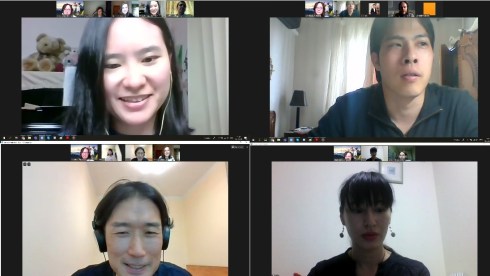
Online meetings “Memories of Oriental Crazy Day”
The third Sunday of May is usually “Oriental Crazy Day” which is the biggest event of the School of Asian Studies, SAS. This is a major event, prepared by HSE students and teachers and is attended by many guests (students and teachers of HSE, students attending HSE’s affiliated High School, applicants for SAS, students of other universities and general Orientalists). You can read more about the event and last year’s activities in this journal or on the HSE website (https://www.hse.ru/en/news/275060364.html(English version).
This year marks the seventh anniversary of Oriental Day. Rather than being discouraged by it’s cancellation this year, the event organizers decided to hold a memory meeting where everyone could share their memories and experiences.
On May 24, Zoom brought together the event’s originator and organizer, Yulia Korovina, a teacher at the School of Asian Studies, teachers and students, students from the School of Young Orientalists, as well as alumni of SAS who had previously participated in the event’s planning or as an audience. Participants shared photos and videos of past events, shared their personal memories, and recollected humorous incidents, unexpected encounters, fun and not-so-fun surprises as well as failed and successful ideas. Many people said the event is becoming bigger, more interesting, and more colorful. They also noted that the number of participants and guests is increasing every year. Despite the fact that it was an online meeting, we were able to create a hopeful atmosphere full of wonderful memories of HSE.
Next year, I hope nothing will prevent us from holding events, and that we will be able to prove once again how stimulating our activities to learn about Oriental countries and cultures can be.
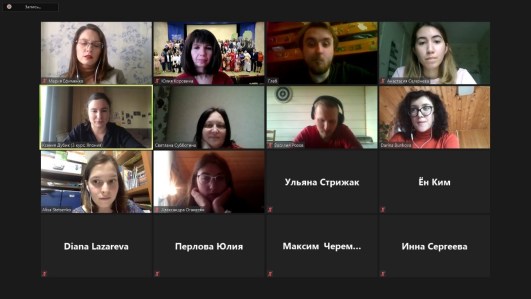
April Activity Report
30 April 2020
Global Japan Office Coordinator
Yulia Korovina
Hello everyone!
Due to the COVID-19 situation, the HSE will continue to have remote classes until the end of this semester, the end of June. Therefore, all events must be cancelled or held online if possible.
However, in response to the current situation, we decided to try Zoom lectures.
April 24: Lecture on “Japanese Culture Color Codes”
On April 24, an open lecture on “Japanese culture color codes” was held by the Japanese club, “Musubi”.
This was our first online lecture, so I didn’t expect nearly 170 people to attend! The lecture was attended not only by students majoring in Japanese in the Oriental department, but also by high school students with an interest in Japanese culture, teachers and students from other departments of HSE, Japanese culture lovers from various cities, and famous experts on Japanese art.
The lecture was led by Prof. Anna Shimanskaya, Ph.D., cultural historian, expert on Japan, and associate professor at the Moscow State Linguistic University.

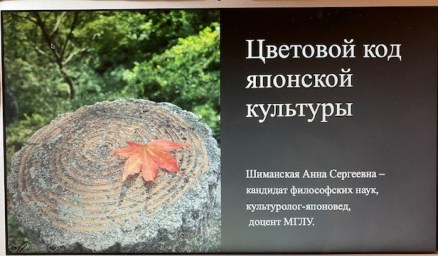
First, she talked about what color is, what functions it serves in a culture, why it is important to know the symbolism of color when you study a particular culture, and how various specialists in cultural research (cultural historians, cultural scholars, linguists, etc.) study color. For example, since it is known to be very expensive to make several shades, fabrics dyed with such unusual shades could only be used by the aristocracy. In addition, different cultures prohibited the use of certain colors by certain classes at different times.
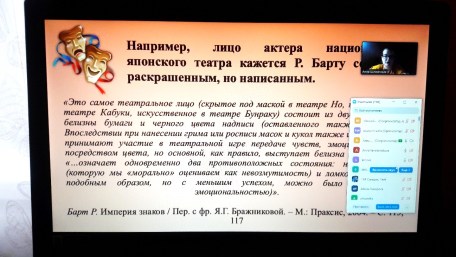
The lecturer then talked about the colors of Japanese culture, listed the five primary colors of Japanese culture (red, white, black, blue and yellow), and briefly explained their meanings.
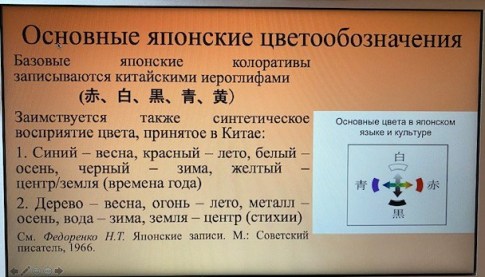
In this lecture, interesting examples of the use of color names in Japanese literature were introduced, particularly from the “Manyoshu” and “Kokin Wakashu”. This shows that color has held great symbolic meaning for Japanese people since ancient times. After the lecture, Ms. Shimanskaya answered questions. The lecture was so interesting that the students asked the teacher to give it again. In future lectures, I hope that Prof. Shimanskaya will explain more about the five primary colors, such as their shades, how they were made, where they were used, what they meant and what their roles were.
April 22: Lecture on “Japan’s Foreign Policy in the Modern World” at the School of Young Orientalists
I am still doing work at the School of Young Orientalists. On April 22, as part of a symposium on foreign policy in Eastern Europe, a lecture on the characteristics of foreign policy in modern Japan was held. The lectures were given by Professor Igor Razumovsky, who is a faculty member at the School of Asian Studies HSE and an expert on Japanese foreign policy and Russia-Japan relations.
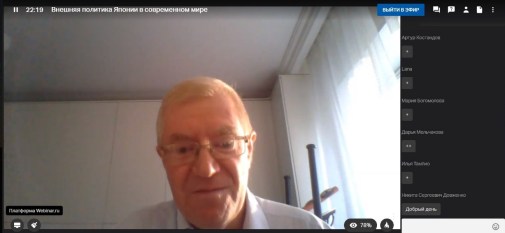
Students from the School of Young Orientalists learnt about Japan’s major partners in neighboring countries, how the Japanese elite and the general public view these partners, and the goals and objectives of Japan’s current foreign policy. In addition, the lecturer talked about what forms and methods are used to implement these policies, the major priorities of Japan’s foreign policy, and the current successes and failures of Japan’s diplomacy. Finally, the lecturer answered questions and recommended literature for further reading.
Despite the apparent difficulties caused by the need to stay home, modern technology has helped us keep in touch, and has helped us continue to teach others the most interesting things about Japan.
